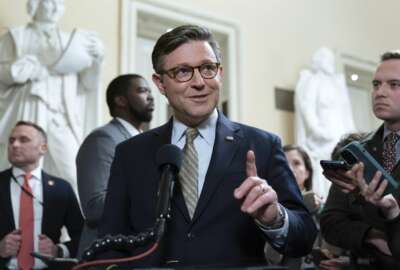The Retirement Wave
In today\'s look at the \"5 Fallacies of Government?\", FederalNewsRadio turns the focus on the \"retirement wave\" of the future.
wfedstaff | June 2, 2015 11:44 pm
By Jane Norris
FederalNewsRadio
Predictions have been made about a coming wave of retirements as baby boomers reach their 60’s. Census Bureau estimates show that 78 million baby boomers were born between 1946 and 1964 and they are now beginning to hit early retirement eligibility. But a funny thing has happened on the way to retirement. Inside the Federal Government and in workplaces all across America, people are simply not retiring when they reach the age of eligibility.
Part of the reason is the economy, but according to a Pew Research Center study, there’s more to the story. Pew Executive VP, Paul Taylor talked about the America’s Changing Workforce study which shows that 93% of the growth in the Labor force from 2006 to 2016 will be among workers ages 55 and older. And this shift has been developing for some time.
Why aren’t people retiring?
The reasons might surprise you. According to Pew, 54% of workers ages 65 and older say the main reason they work is that they want to. Just 17% say the main reason is that they need the paycheck.
The same trends show up in Government retirement projections too. The Office of Personnel Management numbers show that in 2009 almost 60,000 Federal Employees were eligible for retirement and more than 50,000 workers will reach retirement eligibility each year through 2018.
But eligibility doesn’t necessarily mean workers decide to retire, according to a 2008 OPM report that analyzed the issue. Former OPM Director Linda Springer discussed the delay in government retirements with me and says that while retirements from the Federal service might not occur in the exact year of eligibility, retirements do occur in a fairly steady stream.
The OPM report produced while she was the Director showed that the employees stayed with the Government for four more years on average after becoming eligible for retirement and almost 25% remained for nine years or more.
The Effect
So when older workers stay on the job longer, does it cause an imbalance in the labor force? Former Chief Economist for the Labor Department, Dianna Furchtgott Roth, now Director of Employment Policy at the Hudson Foundation says the opposite is true. When older workers stay in the workplace, it’s a benefit because they continue to contribute to the overall economy. According to Furchtgott-Roth, workers in Japan and the United States stay on the job beyond the average age of retirement while retirees in European countries often leave the workforce much earlier.
Current economic conditions are having an impact on retirements as well. Social Security statistics show a 23% spike in applications for early retirements since last year. That spike seems to be related to early retirement claims from laid-off seniors who can’t find other jobs.
The changing face of America
But the bigger picture shows that as the “baby boom” generation approaches retirement, the demographic profile of the U.S. workforce will undergo a substantial shift. A recent study from the Congressional Research Service shows that large number of older workers will be joined by relatively few new entrants to the labor force. According to the Census Bureau, there will be 204 million Americans aged 25 or older in 2010. By 2030, this number will increase by 23% to more than 251 million.
Most of the growth will occur among people aged 65 and older.
The Census Bureau estimates that while the number of people between the ages of 25 and 64 will increase by 15.5 million (9.4%) between 2010 and 2030, the number of people aged 65 and older is projected to grow by 31.7 million, or 79.2%.
As these changes begin to take hold in the nation’s demographic profile, coupled with the reality that older workers want to stay on the job longer, the traditional retirement paradigm begins to change too. The shift in the workforce is evolving retirement trends. Projections, including those made by the Office of Personnel Management, are having trouble keeping up with the phenomenon.
As Peter Orszag, Director of the Office of Management and Budget recently wrote in a blog post: for a variety of reasons including the stubbornly high unemployment rate and current economic conditions, very simply, older workers are forgoing retirement and working longer.
Even workers in the Federal Government, who arguably have one of the best retirement plans in the country, seem to be taking part in this developing trend.
(Copyright 2009 by FederalNewsRadio.com. All Rights Reserved.)
Copyright © 2025 Federal News Network. All rights reserved. This website is not intended for users located within the European Economic Area.





